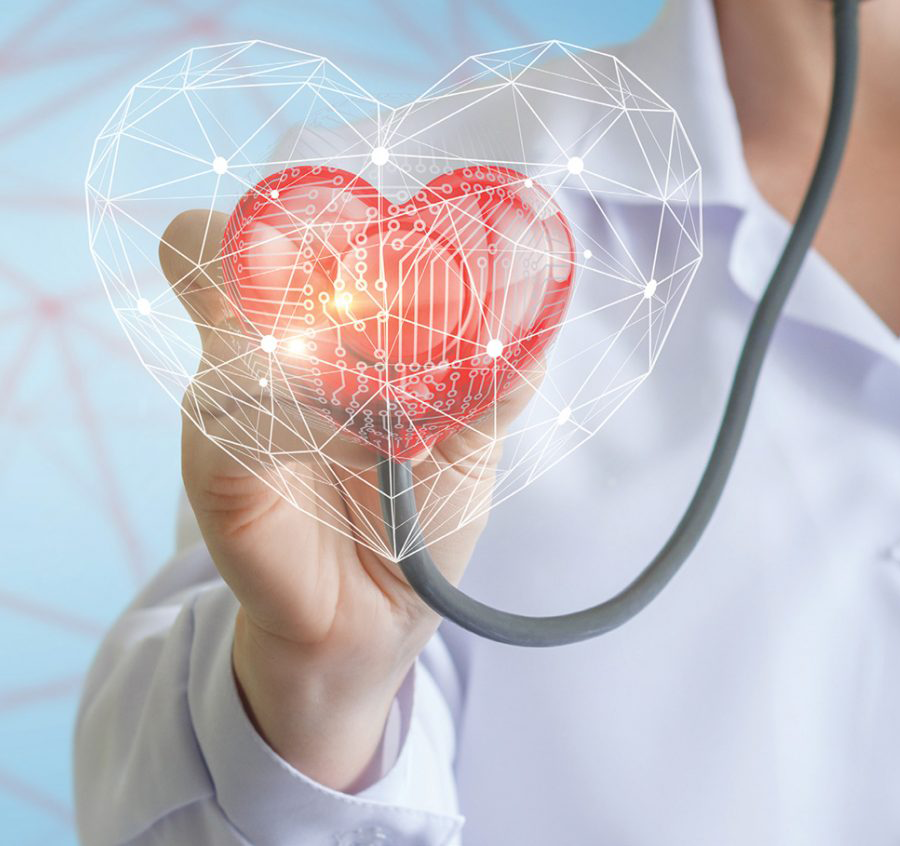Coronary Calcium Score (Heart Scan)
A CT scan for a Coronary Calcium Score is a convenient and noninvasive way of evaluating an individual’s risk for a heart attack. This scan shows the location and extent of calcified soft plaque in the walls of coronary arteries. The Coronary Calcium Scoring scan takes 5-10 minutes and is noninvasive so there is no pain and no injections. The results of this scan help your physician detect coronary artery disease, which is a leading cause of heart attacks in both men and women. St. Joseph Medical Center uses a 128 and 64-sliceCT scanner for Coronary Calcium Scoring. Our scanners are equipped with low-dose technology to limit radiation exposure. This test is not covered by most health insurance or health plans. The fee for the test is $40 dollars and can save your life. You may pay this fee by check, credit card or cash at the time of service.
Calcium Scores are only $40 for a limited time only! Schedule yours today by calling 816-943-4799!
Why it's done
Coronary artery disease results in damage to the arteries primarily due to plaque and inflammation. Plaque deposits in and on the walls of coronary arteries can restrict the flow of oxygen-rich blood to the muscles of the heart. Plaque also may burst, triggering a blood clot that can cause a heart attack.
Plaque is composed of fats, cholesterol, calcium and other substances in the blood. Plaque deposits develop gradually over time, long before there are any signs or symptoms of disease. The imaging test provides an early look at calcium levels. If there is calcium, then there is already some stiffening and narrowing of the artery (atherosclerosis).
A heart scan uses a specialized X-ray technology called multidetector row or multislice computerized tomography (CT), which creates multiple images of the calcium deposits. The amount of detected calcium provides a measure of how much plaque has accumulated, and the data from the scan are used to calculate a score. When combined with other health information, your doctor may use the test score to refine a treatment plan for reducing your risk.
When is a heart scan used?
A heart scan is generally considered useful for people who have a known moderate risk of heart disease or when the risk is uncertain. There are different tools for an initial risk assessment, but all of them use factors, such as your age, sex, blood pressure, cholesterol levels and tobacco use. A moderate risk is generally defined as a 5 to 7.5 percent chance of a heart attack in the next 10 years or when the risk is calculated to be low, but there is a history of heart attacks at an early age in the family.
The American College of Cardiology and the American Heart Association guidelines published in 2013 on cardiovascular risk assessment suggested that it would be reasonable to perform coronary calcium heart scans for people with a calculated risk of 5 to 7.5 percent or when “a risk-based treatment decision is uncertain.”
Some studies have demonstrated that a heart scan may be a motivational factor for people at moderate risk to make lifestyle changes and follow treatment plans.
When is a heart scan not used?
A heart scan does result in radiation exposure. While this exposure is generally considered safe, it is not recommended when there is no likely benefit to getting the scan. In other words, when the scan is not likely to provide any information that is useful in defining your risk or directing a treatment plan, the risk of radiation exposure outweighs any potential benefit.
According to the American College of Cardiology and the American Heart Association guidelines, a heart scan is generally not recommended for the following people:
- Men under age 40 and women under age 50, because detectable calcium at younger ages is not likely
- People who have a low risk, because detectable calcium is highly unlikely, in the absence of family history of heart attacks at early age
- People who already have a known high risk, because the heart scan will likely not provide any additional information to guide treatment decisions
- People who already have symptoms or a diagnosis of heart disease, because the procedure would not help doctors better understand the disease progression or risk
- People who already had an abnormal coronary calcium heart scan
Risks
Heart scans use a type of X-ray technology. Therefore, you are exposed to radiation. The amount of exposure is generally considered safe — about the same amount of radiation you’re naturally exposed to in a year. Your own history of exposure from other medical tests will help your doctor and you discuss your relative risk.
How you prepare
When you schedule your appointment for a heart scan at a hospital or outpatient medical center, ask what special instructions you should follow, how early you should arrive, and what paperwork or identification you will need.
Food and medications
You may be asked to avoid caffeine and smoking for four hours before the test.
Clothing and personal items
When you arrive for the procedure, you will be asked to remove clothing above the waist and to wear a medical gown. You will also need to remove jewelry around your neck or near your chest. In order to make things easier for yourself, you can consider leaving jewelry at home and wearing clothes that are easy to change.
What you can expect
During the procedure
Before the actual scan begins, the technologist will attach sensors, called electrodes, to your chest. These are attached to an electrocardiogram (ECG or EKG), which will record your heart activity during the exam and coordinate the timing of X-ray pictures between heartbeats, when the heart muscles are relaxed.
During the heart scan, you will lie on your back on a movable table. The table will slide you into the tubelike CT scanner. Your head will be outside the scanner the whole time. The exam room will likely be cool.
During the procedure we do not give any medication either by pill or injection that slows your heart to ensure clear images. If you are nervous or anxious, you may be given medication to help you remain calm.
The technologist will operate the scanner from a room next door. He or she will be able to see you and communicate with you. The technologist will ask you to lie still and hold your breath for a few seconds while the X-ray pictures are taken. The machine will make clicking and whirring sounds, and the entire procedure should take 10 to 15 minutes.
After the procedure
There usually aren’t any special precautions you need to take after having a heart scan. You should be able to drive yourself home and continue your daily activities.
Results
The result of the test is usually given as a number called an Agatston score. The score represents a combination of information that reflects the total area of calcium deposits and the density of the calcium.
A score of zero means no calcium is present in the heart and suggests a low likelihood to develop a heart attack in the future. When calcium is present, the higher the score, the higher the risk of attacks in the long term. A score of 100 to 300 — moderate plaque deposition — is associated with a relatively high risk of heart attack or other heart disease over the next three to five years. A score greater than 300 indicates very high to severe disease and heart attack risk.
You also may receive a percentile score, which indicates your amount of calcium relative to people of the same age and sex.
Discussing results with your doctor
Your doctor will discuss the results of the heart scan with you. Depending on the outcome, he or she may recommend:
- Continuing the current course of treatment
- Changing medications
- Changing your diet and exercise routine
- Setting new weight-loss goals
- Ordering additional tests
- Planning for follow-up appointments to monitor your health and adherence to a treatment plan
Featured Services



